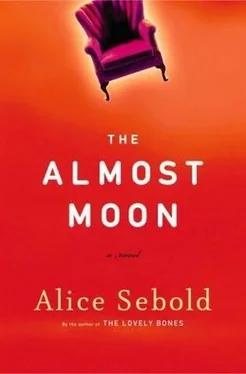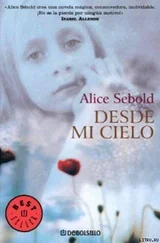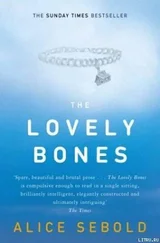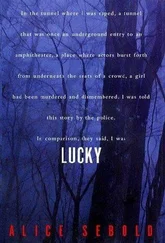And then, just as promptly as I had stood up, I sat back down again on the lump of discarded clothes.
My mother did not make a move to dry her face. She smiled weakly at me and spoke very softly. “Mr. Warner would use a word like ‘consensus.’ He’s a…”
I could fill in the words-an actual Mad Lib! “Pompous ass.”
I could see that my mother was grateful for this, that I had greeted her back on the road she walked down. Water dripped off her nose and lips. Her face appeared glossy in the lamplight.
“One of the men hit me, Mom,” I said.
The more words I spoke, the more I felt my resolve, my separation, my autonomy, leaking away from me. She would own me yet.
She half turned away from me and looked down.
“Helen,” she said.
“Yes.”
“It’s just that…”
“Yes.”
“It’s just that I have… Well, you understand. You’re my daughter. I don’t fit in around here.”
I noticed my mother was toeing the edge of the carpet. The movement was obsessive and seemed to match the rhythm of her shaking hands. Somewhere she was trying to retrieve the language of apology but was struggling.
“Why don’t I brush your hair?” I said. “Like Dad does.”
I stood, and my mother brought her hands up in front of her face. She looked at me from behind them.
“I want to,” I said. “It will feel good, and then we’ll both go to sleep and things will be better in the morning.”
What I did not say was that I did not intend to speak to her again. That in the morning I would wake up and leave the house early so I wouldn’t have to see her. That I would begin to squirrel food away so I could claim I wasn’t hungry at dinnertime. That Mr. Forrest had given me a gift greater than any driving lessons or G &T. He had called my mother “mentally ill,” and I, even if my father never did, was determined to see this as our truth.
The next few weeks were exhilarating. When my father came home, I told him what happened in the yard and that Mr. Forrest had offered to teach me to drive. I didn’t need to mention that I wasn’t speaking to my mother because it was with this news that she greeted him at the door. All I knew was that in not speaking to her, it felt as if I were storing nuts or bullets. I grew stronger every day.
Mr. Forrest would pull up in his Jaguar and honk the horn, and I would grab my jacket and fly down the stairs. Sometimes I would be aware of a shadowy presence in the living room, but it took exactly three giant steps from the bottom of the stairs until I was out the front door, and so I chose to believe that her presence was diminishing with my every escape from it. Outside was sunlight and the willow-green car with the jaguar leaping boundlessly in the air.
Once I was outside my house, Mr. Forrest and his car were only twenty concrete stairs away, but I was always too afraid to slide down the metal banister to get there faster. I had a vision of my head split open on the sidewalk, followed by a vision of my mother, unable to come down to where I’d fallen, unable to call an ambulance, or worse: pushing herself to the point where she stomped around in the brains and muck of me while gasping for air and gesticulating wildly.
When my father began to house-hunt in Frazer, Malvern, and Paoli, he went alone. He took Polaroids of the rooms and yards. He would bring them back to my mother, and in the dining room, they would spread out the photos, making a sort of montage of each house, separated from the others by the dark walnut of the dining table.
I would return from driving with Mr. Forrest, and the three of us would circle around the table, looking cautiously at what might become ours. It was through this experience that my father decided to equip me with a camera of my own.
“This way,” he said, “you can take pictures of your schoolmates or a band recital and bring them home to your mother.”
“I don’t go to band recitals,” I said.
“Right. Well, things you do do, then.”
He smiled weakly, and I knew not to say anything. That somehow doing so would be disloyal in that all of it pointed to the fact that my mother might never again make it past our door.
But I did enjoy the house-shopping via photographs. At night, I could dream about bedrooms that floated in the sky next to a one-car garage in which sat a cherry-red Jaguar with real wood inlay on the dash.
I couldn’t tell sometimes whether my mother was interrogating my father or the houses.
“Fancy wood paneling,” she’d say, “but hideous green carpeting. What do you have to say to that?”
“It looks like grass,” my father said.
“Filthy grass, at best.”
And though it was my turn to speak, I held back.
When it was finally time for my mother to see the three houses that had passed muster, plans were put in place for nearly a week. My mother chose her outfit for the day and kept it laid out in the spare bedroom, where her father’s rifles still had pride of place along one wall. I decided that I would find a silent way to show her my support even if I still refused to speak to her.
I was dieting stringently at the time, and a few mornings before the Saturday of the houses, I sliced up my carrots and celery for the day and stared at them. Using the orange circles of the carrots as notepads, I made my own dietetic version of the sugar hearts from Valentine’s Day. “Good luck!” I wrote with a black felt-tip on one carrot disk. “Triumph!” I wrote on another. Then I got into it. “Fuck them!” I wrote. “Take good care.” “Eat carrots!” “Tallyho!” “Avaunt!”
The next step was to hide them around the house in places she would find them. The toes of the shoes she’d put in the spare room with her outfit. Beneath the fluffy puff I had once coveted inside the powder on her dresser top. In her chipped and lipstick-stained teacup. As I crept about the house, going into and out of each room in search of places to hide these carrot notes, I forgot my hatred of my mother and opened to my love. It was, like a playground seesaw, so easy to pitch from one side to the other.
On the morning of the big day, my father asked me to leave the living area and remain in the kitchen with the swing door closed. By that time my mother had not left the house itself in nearly a year, and our yard in nearly five. The neighbors, knowing my father was spending his weekends house-hunting, had grown oddly quiet.
As my father hustled me into the kitchen and kissed me lightly on the forehead, his thoughts preoccupied with my mother, who was humming loudly upstairs in a wavering voice, I saw the blankets he had stacked on the dining room table and knew what they were for.
The morning had started with my father waking early and coming down to fix my mother breakfast on a tray. He had a volume knob on his love for my mother, and her weakness seemed to turn it up so loudly that the reverb shut me out.
The blankets were meant to calm her. They were heavy gray movers’ blankets. Felt on one side and quilted cotton on the other. My mother had last left the border of our yard when I was eleven. All the way to the local drugstore and back, she had never taken the blanket off her head. Instead, my father and I guided her to the aisle where they sold feminine supplies. No matter how torturous it was for her, she had wanted to be with me when I bought my first menstrual pads.
From my place in the kitchen, I saw her through the diamond-shaped window in the swing door. She was deathly pale and wearing the apricot linen suit that had lain out all week. On her feet were the pumps in which I’d placed the carrot slices. My father embraced her and then held her in his arms as he softly spoke words I couldn’t understand but knew meant comfort. He rubbed her tensed back until she stepped out of his embrace and stood ramrod straight, her posture the stance of the model she’d once been. I saw that she had taken the time to apply what she thought of as outside makeup, not just the powder and gloss she usually wore but the whole nine yards, for no one to see but my father and the dark cloth-mascara, eyeliner, foundation, and red matte lipstick.
Читать дальше












